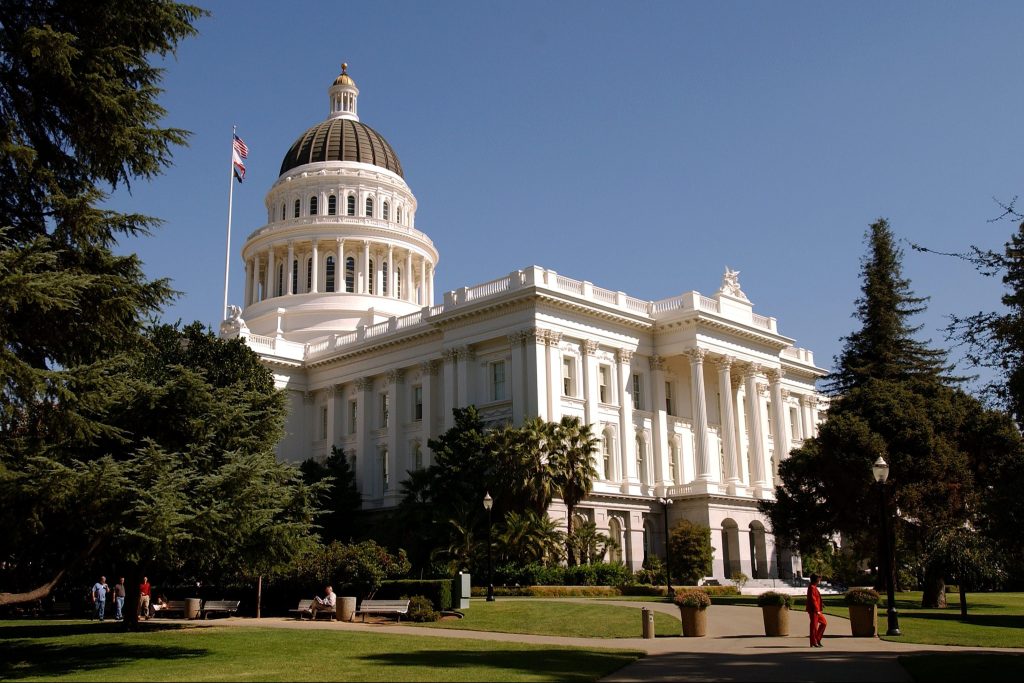On Tuesday, the US Chamber of Commerce, Central Valley Business Federation and American Farm Bureau Federation led a coalition of business organizations in filing a lawsuit aiming to block California’s two landmark corporate climate disclosure laws.
The group asserts that the measures signed into law by Governor Gavin Newsom last year would “impermissibly compel thousands of businesses to make costly, burdensome, and politically fraught statements” about their operations around the world. The complaint was filed in the US District Court for the Central District of California. The action goes on to claim the first-of-their-kind laws will impose “massive” costs on businesses and violate free speech protections in the US Constitution by compelling the disclosures.
The plaintiffs are seeking a ruling blocking implementation of the laws, the Climate Corporate Data Accountability Act (SB253) and Climate-Related Financial Risk Act (SB261), on the grounds that they violate the First Amendment by compelling speech on a “controversial” issue and that California is attempting to act as a de facto national emissions regulator.
US Clean Air Act
Federal regulators are exclusively empowered to regulate emissions under the US Clean Air Act, and are best situated to develop regulations that apply consistently across the country, the groups said in the lawsuit.
“California’s laws usurp the role of federal regulators, opening the door for other states to take an opposite approach to disclosure, leaving businesses and their investors caught in the middle of a political scrap between states,” said Tom Quaadman, an executive director at the Chamber of Commerce.
The California Air Resources Board (CARB), which was named as a defendant in the lawsuit, declined to comment to the news outlets about the pending lawsuit.
The California laws
The two state laws the plaintiffs cite revolve around helping the public and investors evaluate climate-related claims by major companies that were passed in October 2023.
One of them requires thousands of public and private businesses that operate in California, and make more than $1 billion annually, to report their direct and indirect emissions starting in 2026. This means corporations from oil and gas companies to retail giants would have to disclose their direct greenhouse gas emissions as well as those that come from activities such as employee business travel. It is the most sweeping mandate of its kind in the nation.
The law requires the disclosure of both the companies’ own emissions and indirect emissions by their suppliers and customers, also known as Scope 3 emissions.
The other challenged law requires companies that operate in the state with over $500m in revenue to disclose climate-related financial risks and strategies to mitigate that risk.
Other states are considering laws in this arena, the EU already has its own regime, and Australia is implementing its own corporate disclosure laws, all of which impact many US companies.
Both of the laws were supported by several big companies including Apple, Google, Patagonia, Salesforce and Microsoft.
Many companies in California already have to disclose their direct emissions through the state’s cap and trade program. This program has been around since 2013, and it allows large emitters to buy allowances from the state to pollute and trade them with other companies. It is one of the largest in the world.
In January, Newsom announced a surprise funding cut to CARB in his proposed budget for 2024-2025, saying it was needed to close the state’s $37.9 billion budget deficit. The effect has been to delay the implementation of the new laws, SB 253 SB 261, which CARB oversees, until more clarity on the state’s finances is available.
Comprehensive assessment
The ESG regulatory arena remains a quagmire for companies who have no true guidance in the US about what to disclose and how.
The SEC is in the midst of crafting its own climate disclosure rules, and businesses are worried about how stringent the securities regulator will be, even though the agency has indicated it is likely to scrap the Scope 3 emissions disclosure requirement.
Worth noting is that other states – such as New York – are considering laws in this arena, the EU already has its own regime with its European Union Corporate Sustainability Reporting Directive, and Australia is implementing its own corporate disclosure laws, all of which affect many US companies.
Companies should expect that additional and more robust transparency and disclosures are coming in some form, and that even if the proposed SEC ones don’t make it past this year, the local and international ones certainly should.
In the meantime, there will be lawsuits and stakeholder activism on both sides – and greenwashing claims. Not actually doing what you say you’re doing is such a compliance no-no that it might be the binding factor uniting everyone right now, and it needs to remain toward the top of the monitoring list.
















